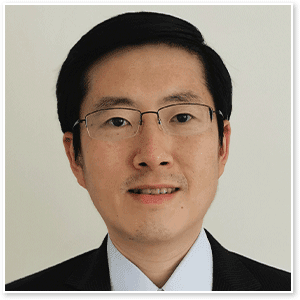
The ACS journals ACS Macro Letters, Biomacromolecules, and Macromolecules in partnership with the Division of Polymer Chemistry are proud to announce the selection of Changle Chen of the University of Science and Technology of China and Rebekka Klausen of Johns Hopkins University as the winners of the 2022 ACS Macro Letters/Biomacromolecules/Macromolecules Young Investigator Award.
Professors Chen and Klausen will be honored during an award symposium at the ACS Fall National Meeting, August 21 – 25, 2022.
2022 ACS Macro Letters/Biomacromolecules/Macromolecules Young Investigator Award Winners

Changle Chen, University of Science and Technology of China
Professor Chen was selected for this award to honor his pioneering contributions in the field of olefin polymerization including development of new catalyst systems, design of new polymerization modulation strategies, and the synthesis and property studies of special polyolefins and polar functionalized polyolefins materials, with the “polar monomer problem” as the central theme.
Can you give us a short overview of the research you are currently undertaking?
“The introduction of a small amount of polar functional groups into polyolefins could excise great control over important material properties. As the most direct and economic strategy, the copolymerization of olefin with polar functionalized monomers represents one of the biggest challenges in this field. With the “polar monomer problem” as the central theme, the research works from my group focus on the development of new catalyst systems, design of new polymerization modulation strategies, and the synthesis and property studies of specialty polyolefins and polar functionalized polyolefins materials.”
What’s one piece of advice you’d give to someone just entering the field?
“My advice for someone just entering the field is to find the subject that you are passionate about. That way, you will enjoy what you do every day for the rest of your career. You should also be bold enough to come out of your comfort zone and to explore challenging new research areas.”
Is there anyone who has been a great role model, mentor, or inspiration to you?
“My Ph.D. mentor, Prof. Richard Jordan at the University of Chicago, provided me with rigorous Ph.D. training, which really shaped me as a good synthetic chemist. My postdoctoral adviser, Prof. Tobin Marks at Northwestern University, inspired me to think outside the box and to explore new areas.”
Some of Professor Chen’s latest research:
Systematic Investigations of Ligand Steric Effects on α-Diimine Palladium Catalyzed Olefin Polymerization and Copolymerization
DOI: 10.1021/acs.macromol.6b02104
Aluminum Tralen Complex Meditated Reversible-Deactivation Radical Polymerization of Vinyl Acetate
DOI: 10.1021/acsmacrolett.0c00455
Direct Synthesis of Polar Functionalized Polyethylene Thermoplastic Elastomer
DOI: 10.1021/acs.macromol.0c00083
Rebekka Klausen, Johns Hopkins University

Prof. Rebekka Klausen was selected for this award in recognition of her transformative achievements in the synthesis of polymers inaccessible from traditional feedstocks on two parallel tracks: silicon-inspired conjugated polymers and boron-functionalized polyolefins.
Can you give us a short overview of the research you are currently undertaking?
“I’m motivated by open-ended, curiosity-driven questions. Right now, something I’m thinking about a lot is tacticity in inorganic polymers like the organosilicon and organoboron polymers we’ve described in the last few years (Macromolecules 2018, 51, 6859). For main group organometallic compounds, the fundamental principles of stereoselective synthesis can be very different than for organic small molecules. This means that we may need new synthetic solutions for macromolecules. And if we can achieve that synthetic control, what would tacticity mean for the bulk properties of inorganic polymers?”
What’s one piece of advice you’d give to someone just entering the field?
“As important as it is to have a network of senior mentors, I think it’s also really important to have a strong peer network. My peers in the field have been so important for bouncing ideas back and forth, sharing draft manuscripts and proposals, and mutual support of all kinds. Those peer relationships have sometimes deepened into friendships, collaborations, or both!”
Is there anyone who has been a great role model, mentor, or inspiration to you?
“My children inspire me a lot. They’re expressive and enthusiastic about the things they like. A lot about the world is new to them, but they approach it with curiosity. And if something doesn’t work the first time, they try again a different way. Those traits of authenticity, fearlessness, and resilience are values I aspire to as a scientist.”
Some of Professor Klausen’s latest research:
An Organoborane Vinyl Monomer with Styrene-like Radical Reactivity: Reactivity Ratios and Role of Aromaticity
DOI: 10.1021/acs.macromol.8b01368
Syndioselective Polymerization of a BN Aromatic Vinyl Monomer
DOI: 10.1021/acs.macromol.8b01707
Organoborane Strategy for Polymers Bearing Lactone, Ester, and Alcohol Functionality
